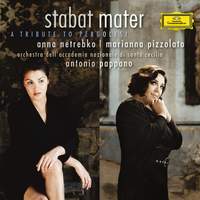Recording of the Week,
Pergolesi's Stabat Mater
Although Italian Baroque composer Giovanni Battista Pergolesi died tragically young at the age of just 26, he achieved a lasting reputation through a limited number of exceptional works. His comic opera La serva padrona had a significant influence on the future direction of the genre, while his Stabat Mater became one of the most popular pieces of sacred music in the repertoire and is still regularly performed today. Indeed it is a new recording of the Stabat Mater, released next Monday, which is the inspiration behind this week’s newsletter.

The recording was made last summer during what was Pergolesi’s anniversary year (he was born in 1710) and features star soloist Anna Netrebko, along with mezzo Marianna Pizzolato, accompanied by the Orchestra dell’ Accademia di Santa Cecilia under Antonio Pappano. It immediately stands out, as the big operatic voice of Netrebko isn’t what you would normally imagine for this small intimate work. I had my doubts before hearing it but have been completely won over by the beauty of the singing and playing, and the genuine, honest and heart-felt approach to the music.
Netrebko and Pizzolato’s voices are perfectly matched. They have similar colours and they blend so well that you cannot always even tell who is singing which line. The text for the Stabat Mater tells of the suffering of the Virgin Mary during the crucifixion of her son. Pappano likens Pergolesi’s setting to two sisters by Mary’s side, sharing in her grief. It is hugely powerful music, and part of Pergolesi’s great skill is his ability to show such sorrow and pathos in faster movements as well as slower ones. This gives the whole work a drama and emotional narrative which is key to its success.
Pappano sensibly employed Alessandro Moccio (the leader of Philippe Herreweghe’s Orchestre des Champs-Elysées) to lead the Orchestra, and his advice on matters like bowing, phrasing and general stylistic awareness is clearly evident in the recording.
Compared to a performance by Baroque specialists, it still sounds noticeably richer and fuller, and tempos are generally a little slower, but then accompanying these singers that probably isn’t inappropriate. And although both singers and instrumentalists do use vibrato most of the time, they vary it to help colouring and phrasing in a very natural sounding way. Meanwhile Pappano’s love of long Italian vocal lines sounds entirely at home in this music.
Coupled with the Stabat Mater are two cantatas (one for Netrebko and one for Pizzolato) and a short Instrumental Sinfonia, and as a mark of how important a release this is Deutsche Grammophon have produced two versions from which to chose – a standard edition and what they call a ‘prestige’ edition. The latter comes in a deluxe hardback book, and contains a bonus DVD including a 35 minute documentary on the recording, as well as more extensive booklet notes and full texts and translations. I’ve given you a short video which is essentially drawn from the documentary and gives you a good introduction to the music and the recording. Enjoy!
Anna Netrebko (soprano) & Marianna Pizzolato (contralto), Orchestra dell’ Accademia di Santa Cecilia, Antonio Pappano
Available Formats: MP3, FLAC



